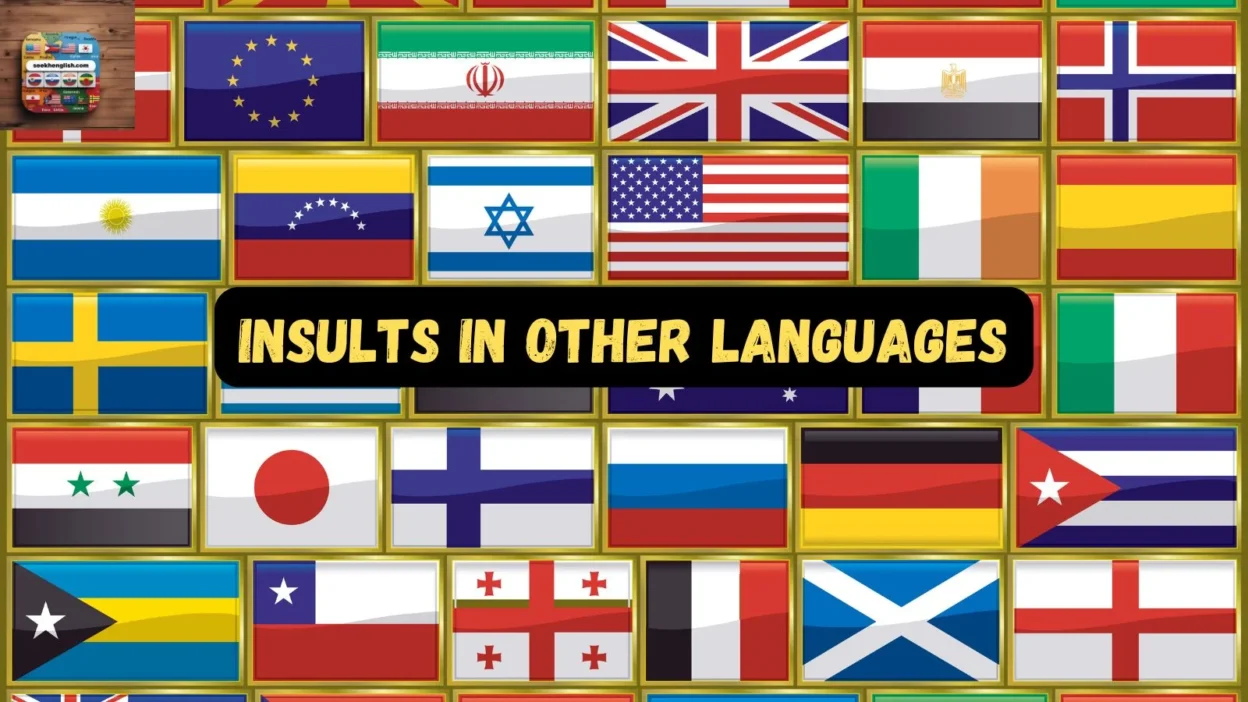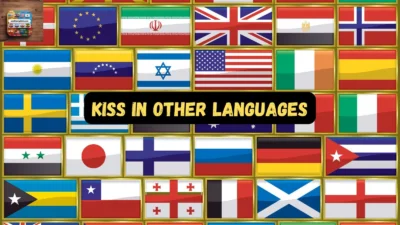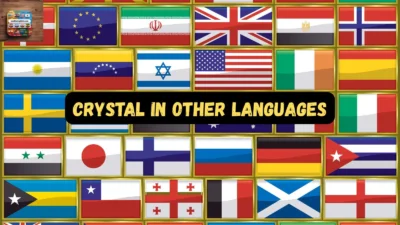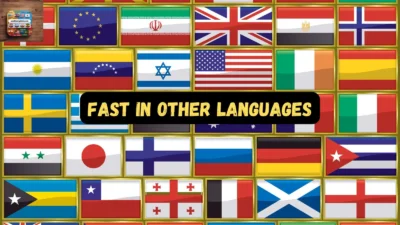People often search for how to say Insults in Other Languages to understand slang, culture, or communication in global contexts. Whether you’re watching movies, reading literature, or just curious about how different societies express offense, this guide will help you learn.
Here, you’ll find translations of “insults” in 650+ different languages, along with pronunciation and an example sentence. This list helps you understand the meaning and use of the word “insults” so you can recognize it in conversations, literature, or translations.
How to Say “Insults” in 650 Different Languages
- Afrikaans (🇿🇦) – beledigings | Pronunciation: beh-leh-ding-ings Example: Hy het beledigings gebruik. (“He used insults.”)
- Albanian (🇦🇱) – fyerje | Pronunciation: fee-air-yeh Example: Ai bëri disa fyerje. (“He made some insults.”)
- Amharic (🇪🇹) – ስድብ (sidib) | Pronunciation: si-dib Example: እርሱ ስድብ ተናገረ። (“He spoke insults.”)
- Arabic (🇸🇦) – إهانات (ihanat) | Pronunciation: ee-ha-naat Example: قال إهانات كثيرة. (“He said many insults.”)
- Armenian (🇦🇲) – վիրավորանքներ (viravorankner) | Pronunciation: vee-rah-vo-rank-ner Example: Նա վիրավորանքներ ասաց։ (“He said insults.”)
- Azerbaijani (🇦🇿) – təhqirlər | Pronunciation: teh-kh-re-lar Example: O, təhqirlər işlətdi. (“He used insults.”)
- Bangla (🇧🇩) – অপমান (opoman) | Pronunciation: oh-po-man Example: সে অপমানজনক কথা বলেছে। (“He spoke insulting words.”)
- Basque (🇪🇸) – irainak | Pronunciation: ee-rah-in-ak Example: Hitz irainak erabili zituen. (“He used insulting words.”)
- Belarusian (🇧🇾) – абразы (abrazy) | Pronunciation: ah-bra-zy Example: Ён сказаў абразы. (“He said insults.”)
- Bengali (🇮🇳) – গালি (gali) | Pronunciation: gah-lee Example: সে অনেক গালি দিয়েছে। (“He gave many insults.”)
- Bosnian (🇧🇦) – uvrede | Pronunciation: oov-reh-deh Example: On je rekao uvrede. (“He said insults.”)
- Bulgarian (🇧🇬) – обиди (obidi) | Pronunciation: oh-bee-dee Example: Той каза обиди. (“He said insults.”)
- Catalan (🇪🇸) – insults | Pronunciation: in-sools Example: Va dir molts insults. (“He said many insults.”)
- Chinese (🇨🇳) – 侮辱 (wǔrǔ) | Pronunciation: woo-roo Example: 他说了侮辱的话。 (“He said insulting words.”)
- Croatian (🇭🇷) – uvrede | Pronunciation: oov-reh-deh Example: On je koristio uvrede. (“He used insults.”)
- Czech (🇨🇿) – urážky | Pronunciation: oo-rah-shkee Example: Řekl urážky. (“He said insults.”)
- Danish (🇩🇰) – fornærmelser | Pronunciation: for-nair-mel-ser Example: Han kom med fornærmelser. (“He made insults.”)
- Dutch (🇳🇱) – beledigingen | Pronunciation: beh-leh-dee-hingen Example: Hij maakte beledigingen. (“He made insults.”)
- English (🇬🇧) – insults | Pronunciation: in-sults Example: He threw insults at his opponent.
- Estonian (🇪🇪) – solvanguid | Pronunciation: sol-van-guid Example: Ta ütles solvanguid. (“He said insults.”)
- Finnish (🇫🇮) – loukkaukset | Pronunciation: lowk-kowk-set Example: Hän käytti loukkauksia. (“He used insults.”)
- French (🇫🇷) – insultes | Pronunciation: an-sylt Example: Il a dit des insultes. (“He said insults.”)
- Galician (🇪🇸) – insultos | Pronunciation: in-sool-tos Example: El dixo insultos. (“He said insults.”)
- Georgian (🇬🇪) – შეურაცხყოფა (sheuratskhop’va) | Pronunciation: she-oo-rats-khop-va Example: მან თქვა შეურაცხყოფა. (“He said insults.”)
- German (🇩🇪) – Beleidigungen | Pronunciation: beh-lai-dee-goong-en Example: Er machte Beleidigungen. (“He made insults.”)
- Greek (🇬🇷) – προσβολές (prosvolés) | Pronunciation: pros-vo-les Example: Είπε προσβολές. (“He said insults.”)
- Gujarati (🇮🇳) – અપમાન (apmaan) | Pronunciation: up-maan Example: તેણે અપમાનજનક શબ્દો કહ્યા. (“He said insulting words.”)
- Haitian Creole (🇭🇹) – jouman | Pronunciation: joo-man Example: Li te fè anpil jouman. (“He made many insults.”)
- Hausa (🇳🇬) – zagi | Pronunciation: zah-gee Example: Ya yi zagi da yawa. (“He said many insults.”)
- Hebrew (🇮🇱) – עלבונות (elbonot) | Pronunciation: el-bo-not Example: הוא אמר עלבונות. (“He said insults.”)
- Hindi (🇮🇳) – गालियाँ (gaaliyaan) | Pronunciation: gaa-lee-yaan Example: उसने बहुत गालियाँ दीं। (“He gave many insults.”)
- Hungarian (🇭🇺) – sértések | Pronunciation: share-tay-shek Example: A férfi sértéseket mondott. (“The man said insults.”)
- Icelandic (🇮🇸) – móðganir | Pronunciation: mooth-ga-neer Example: Hann sagði móðganir. (“He said insults.”)
- Igbo (🇳🇬) – mkparị | Pronunciation: mk-pa-ree Example: Ọ kwuru ọtụtụ mkparị. (“He said many insults.”)
- Indonesian (🇮🇩) – penghinaan | Pronunciation: peng-hee-nan Example: Dia mengucapkan penghinaan. (“He said insults.”)
- Irish (🇮🇪) – maslaí | Pronunciation: mahs-lee Example: Dúirt sé maslaí. (“He said insults.”)
- Italian (🇮🇹) – insulti | Pronunciation: in-sool-tee Example: Ha detto insulti. (“He said insults.”)
- Japanese (🇯🇵) – 侮辱 (bujoku) | Pronunciation: boo-joh-koo Example: 彼は侮辱を言った。 (“He said insults.”)
- Javanese (🇮🇩) – ngenyek | Pronunciation: nge-nyek Example: Dheweke ngucap ngenyek. (“He said insults.”)
- Kannada (🇮🇳) – ಅವಮಾನ (avamāna) | Pronunciation: ava-maana Example: ಅವನು ಅವಮಾನಕರ ಮಾತುಗಳಾಡಿದ. (“He spoke insulting words.”)
- Kazakh (🇰🇿) – қорлау (qorlau) | Pronunciation: kor-lau Example: Ол қорлау сөздер айтты. (“He said insulting words.”)
- Khmer (🇰🇭) – សំដីបង្អស់ (somdei bong-os) | Pronunciation: som-day bong-os Example: គាត់និយាយពាក្យសំដីបង្អស់។ (“He said insults.”)
- Kinyarwanda (🇷🇼) – gutuka | Pronunciation: goo-too-kah Example: Yaravuze amagambo yo gutuka. (“He said insulting words.”)
- Korean (🇰🇷) – 모욕 (moyok) | Pronunciation: mo-yok Example: 그는 모욕적인 말을 했다. (“He said insulting words.”)
- Kurdish (🇮🇶) – hêrsandin | Pronunciation: hair-san-din Example: Ew hêrsandin got. (“He said insults.”)
- Kyrgyz (🇰🇬) – акарат | Pronunciation: ah-kar-at Example: Ал акарат айтты. (“He said insults.”)
- Lao (🇱🇦) – ດ່າ (da) | Pronunciation: dah Example: ລາວດ່າຄົນອື່ນ. (“He insulted others.”)
- Latvian (🇱🇻) – apvainojumi | Pronunciation: ap-vai-noo-mee Example: Viņš teica apvainojumus. (“He said insults.”)
- Lithuanian (🇱🇹) – įžeidimai | Pronunciation: ee-zhay-dee-mai Example: Jis pasakė įžeidimus. (“He said insults.”)
- Luxembourgish (🇱🇺) – Beleedegungen | Pronunciation: beh-lay-dee-gun-gen Example: Hien huet Beleedegungen gemaach. (“He made insults.”)
- Macedonian (🇲🇰) – навреди (navredi) | Pronunciation: nav-reh-dee Example: Тој кажа навреди. (“He said insults.”)
- Malagasy (🇲🇬) – faniratsirana | Pronunciation: fah-nee-rat-see-rah-nah Example: Niteny faniratsirana izy. (“He said insults.”)
- Malay (🇲🇾) – penghinaan | Pronunciation: peng-hee-nan Example: Dia berkata penghinaan. (“He said insults.”)
- Malayalam (🇮🇳) – അപമാനം (apamaanam) | Pronunciation: ah-pa-maa-nam Example: അവൻ അപമാന വാക്കുകൾ പറഞ്ഞു. (“He said insulting words.”)
- Maltese (🇲🇹) – insulti | Pronunciation: in-sool-tee Example: Huwa qal insulti. (“He said insults.”)
- Maori (🇳🇿) – tawai | Pronunciation: tah-wai Example: I mea ia he tawai. (“He said insults.”)
- Marathi (🇮🇳) – अपमान (apmaan) | Pronunciation: up-maan Example: त्याने अपमानास्पद शब्द वापरले. (“He used insulting words.”)
- Mongolian (🇲🇳) – доромжлол (doromjlol) | Pronunciation: do-rom-jlol Example: Тэр доромжлол хэлсэн. (“He said insults.”)
- Myanmar (🇲🇲) – ဆဲစာ (hsay hsa) | Pronunciation: say-sah Example: သူ ဆဲစာ ပြောပါတယ်။ (“He said insults.”)
- Nepali (🇳🇵) – अपमान (apmaan) | Pronunciation: up-maan Example: उसले अपमानजनक कुरा गर्यो। (“He said insulting words.”)
- Norwegian (🇳🇴) – fornærmelser | Pronunciation: for-nair-mel-ser Example: Han kom med fornærmelser. (“He made insults.”)
- Odia (🇮🇳) – ଅପମାନ (apamaan) | Pronunciation: a-pa-maan Example: ସେ ଅପମାନ ଶବ୍ଦ କହିଲା। (“He said insulting words.”)
- Pashto (🇦🇫) – توهینونه (toheenoona) | Pronunciation: to-hee-noo-na Example: هغه توهینونه وکړل. (“He made insults.”)
- Persian (🇮🇷) – توهینها (tohinha) | Pronunciation: to-heen-ha Example: او توهینها گفت. (“He said insults.”)
- Polish (🇵🇱) – obelgi | Pronunciation: oh-bel-gee Example: On powiedział obelgi. (“He said insults.”)
- Portuguese (🇵🇹) – insultos | Pronunciation: in-sool-tos Example: Ele disse insultos. (“He said insults.”)
- Punjabi (🇮🇳) – ਬੇਇਜ਼ਤੀ (beizzati) | Pronunciation: bay-iz-za-tee Example: ਉਸਨੇ ਬੇਇਜ਼ਤੀ ਵਾਲੀਆਂ ਗੱਲਾਂ ਕੀਤੀਆਂ। (“He said insulting things.”)
- Quechua (🇵🇪) – juchachiy | Pronunciation: hoo-cha-chee Example: Pay juchachiy rimarqa. (“He said insults.”)
- Romanian (🇷🇴) – insulte | Pronunciation: in-sool-te Example: El a spus insulte. (“He said insults.”)
- Russian (🇷🇺) – оскорбления (oskorbleniya) | Pronunciation: os-kor-ble-nee-ya Example: Он сказал оскорбления. (“He said insults.”)
- Samoan (🇼🇸) – upu faifai | Pronunciation: oo-poo fai-fai Example: Na ia fai mai upu faifai. (“He said insults.”)
- Scots Gaelic (🏴) – maslaidhean | Pronunciation: mahs-lee-yen Example: Thuirt e maslaidhean. (“He said insults.”)
- Serbian (🇷🇸) – увреде (uvrede) | Pronunciation: oov-re-de Example: Он је рекао увреде. (“He said insults.”)
- Sesotho (🇱🇸) – lihlapa | Pronunciation: lee-hla-pah Example: O buile ka lihlapa. (“He said insults.”)
- Shona (🇿🇼) – kutuka | Pronunciation: koo-too-kah Example: Akataura mashoko ekutuka. (“He said insults.”)
- Sindhi (🇵🇰) – تڪليف (takleef) | Pronunciation: tak-leef Example: هن تڪليف ڏيندڙ لفظ چيو. (“He said insulting words.”)
- Sinhala (🇱🇰) – අපහාස (apahasa) | Pronunciation: apa-ha-sa Example: ඔහු අපහාස කළා. (“He made insults.”)
- Slovak (🇸🇰) – urážky | Pronunciation: oo-rah-shkee Example: Povedal urážky. (“He said insults.”)
- Slovenian (🇸🇮) – žalitve | Pronunciation: zha-leet-veh Example: Rekel je žalitve. (“He said insults.”)
- Somali (🇸🇴) – aflagaaddo | Pronunciation: af-la-ga-do Example: Wuxuu yidhi aflagaaddo. (“He said insults.”)
- Spanish (🇪🇸) – insultos | Pronunciation: in-sool-tos Example: Dijo muchos insultos. (“He said many insults.”)
- Sundanese (🇮🇩) – hinaan | Pronunciation: hee-nahn Example: Anjeunna nyarios hinaan. (“He said insults.”)
- Swahili (🇰🇪) – matusi | Pronunciation: mah-too-see Example: Alisema matusi. (“He said insults.”)
- Swedish (🇸🇪) – förolämpningar | Pronunciation: fur-oh-lamp-ning-ar Example: Han sade förolämpningar. (“He said insults.”)
- Tagalog (🇵🇭) – insulto | Pronunciation: in-sul-to Example: Sinabi niya ang mga insulto. (“He said insults.”)
Conclusion
No matter where you go in the world, the word “insults” reminds us to use our words wisely and choose kindness over anger.



